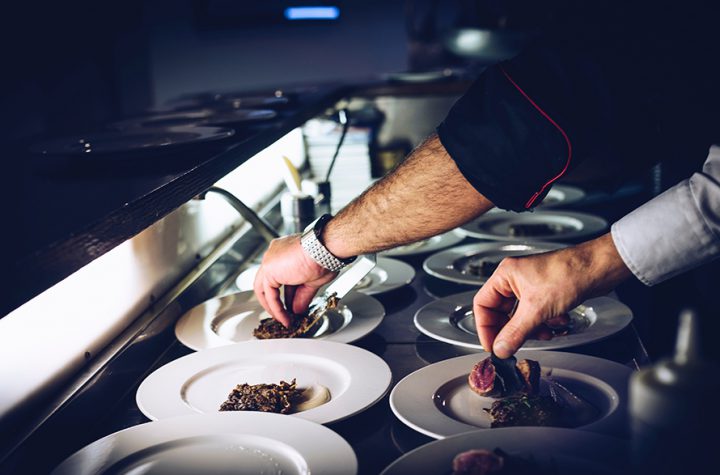
When Amazon expanded into US groceries and healthcare, the established players in the sector feared the arrival of a rich, tech-savvy disrupter. But when the ecommerce giant unveiled its long-awaited foray into luxury goods last month, the response was a collective shrug.
Amazon opened its Luxury Stores as a separate space on its mobile app, which is available only in the US “by invitation” to subscribers to its Prime loyalty scheme. Instead of its usual utilitarian look, the app tries to conjure up a luxury ethos with a gold logo against a cream-coloured background. It was launched with an ad featuring British actress Cara Delevingne.
But while industry executives were publicly polite, privately many mocked the launch for being late to the game and going live with only a single brand: dressmaker Oscar de la Renta.
Frederic Court, whose venture capital fund Felix Capital was an early backer of online fashion marketplace Farfetch, said Amazon would struggle to break into luxury’s exclusive club.
“If they decide to have a real go, they may get somewhere given they have so much talent, capital, and logistics and delivery expertise,” said Mr Court. “But if you don’t have Gucci, Saint Laurent, Prada and Dior, then it’s hard to be a real destination for luxury shoppers. You need the brands you can find on Avenue Montaigne in Paris.”
Luxury’s biggest groups LVMH, Kering and Hermès remain prominent refuseniks. Referring to online-only players, LVMH’s Bernard Arnault said at its annual results conference in January: “We’ve been asked several times to participate in these businesses, and I’ve always said no.” He said that his reservations are partly because of concerns counterfeiters use sites such as Amazon to sell fakes.
‘If you don’t have Gucci, Saint Laurent, Prada and Dior, then it’s hard to be a real destination for luxury shoppers,’ said Frederic Court of Felix Capital, an early backer of online fashion marketplace Farfetch © Bloomberg
Bruno Pavlovsky, the president of Chanel’s fashion division, told the Financial Times this week that the French luxury group “will not sell any fashion products” on Amazon, but did not rule out using it to sell beauty products as it does in China with Alibaba.
Since last month’s launch, Amazon has added more brands, including Joseph Altuzarra, a New York-based ready-to-wear designer, lingerie from La Perla, designer clothing from London’s Roland Mouret, and high-end beauty products from Clé de Peau. A spokesperson said more were on the way.
The question now is whether high-spending luxury customers will follow. Globally, Amazon has 150m Prime customers, who are accustomed to fast delivery of everything from cat food to shoes. Luxury Stores may get traction if it can attract even some of them.
Amazon’s move into luxury comes at an opportune moment: the Covid-19 pandemic has accelerated the transition to online shopping, even for €10,000 handbags.
With luxury sales expected to take three years to recover to pre-pandemic levels, big brands are more open than ever to selling online and many are seeking new ways to woo clients via messaging apps or email. While the lavish in-store experience will always be central to luxury, a period of online experimentation is afoot.
Meanwhile, after years of declining sales, the fallout from the coronavirus pandemic has finally killed off several US-based department stores, such as Lord & Taylor and Neiman Marcus. This has deprived independent fashion brands of their main distribution channel and some are scrambling for alternatives, including selling more via their own websites and online stores. Critics said Amazon’s Luxury Stores may face a reverse selection bias, where it is most likely to attract accessibly priced or struggling brands.
Ecommerce has momentum: by 2025, consultancy Bain & Company estimates that roughly one-third of luxury’s annual sales will be made online, up from 12 per cent of total sales of €281bn in 2019. The shift is being driven by millennials and customers in China — both the world’s most advanced ecommerce market and the fastest-growing market for luxury goods.
Amazon is entering luxury after years of expanding in mid-market fashion via acquisitions of online shoe seller Zappos and clothing outlet Shopbop.
So far, it has given few details on its ambitions for Luxury Stores and declined an interview request. “Fashion is a priority for our customers and therefore a priority for us worldwide,” it said in an emailed statement. “We’re just at the beginning of what we expect to accomplish.”
Amazon’s pitch to brands is that it can help them create “innovative, content-driven tools” to engage with shoppers, such as its View in 360 button that allows people to visualise how a garment will look on various body types.
In an attempt to allay fears about eroding the exclusivity of the online experience, the store will be walled off from the broader website. And most importantly, participating brands will control the design of their shop within the app, as well as being able to select what items are sold on there and at what price. This is known in the industry as a concession or marketplace model, and was adopted by Farfetch and Alibaba’s Tmall Luxury Pavilion.
It contrasts with the so-called wholesale model used by online retailers, department stores, and rival online seller Yoox Net-a- Porter. Those companies buy inventory from fashion brands, store it in their warehouses, and then can offer discounts if it does not sell at full price.
Luxury brands tend to prefer the concession model because it offers more control, less discounting, and ability to move inventory. But their ideal model is to sell directly on their own-branded websites where they do not have to give away any commission and do not dilute their brand equity, industry executives said. Customers can be drawn in by Instagram or TikTok posts from brands, or with well-placed links on Google searches for products.
Net-a-Porter’s ‘The Sporty Jacket’ campaign © AP
As one sector executive put it: “For fashion brands, wholesale is heroin and Farfetch is methadone. Everyone wants to get clean and sell directly.”
Amazon may be betting that it can replicate the success that Alibaba’s Tmall has had in China. Initially, luxury brands mistrusted Alibaba as down-market and rife with counterfeits. But once it moved to a concession model with a separate safe space for luxury brands, many were won over. They now see Tmall as a key online gateway to Chinese customers.
Amazon’s Luxury Store is entering a crowded field of multi-brand online retailers, and will compete with established companies such as Farfetch, Yoox Net-a-Porter, MatchesFashion and MyTheresa. Such sites have supplanted the roles once played by department stores and fashion magazines — namely discovering new designers, tracking what is in style, and giving inspiration about what to wear.
Few of them have cracked profitability despite growing user bases, so they may eventually be forced to consolidate, said Claudia D’Arpizio, a consultant to the luxury industry at Bain. “Amazon can pose a real challenge to these etailers, as well as take share from physical department stores, which are already struggling,” she said.
José Neves, the founder and chief executive of Farfetch, said his company had a “strong competitive moat” against Amazon, namely its relationships with the biggest luxury brands honed over more than a decade. Farfetch sells some 3,500 brands on its site and 500 of them operate on the concession model to sell directly to customers.
“Luxury is an industry of relationships. Most true luxury brands are European and family run. For them the protection of brand equity is paramount,” said Mr Neves. “From the conversations we’ve had with them about Amazon, having another multi-brand store is not of strategic importance, and it could even be a losing proposition if it cannibalises existing channels.”
For Amazon, the plan is that more brands follow Oscar de la Renta, which sees its partnership with the ecommerce giant as a good way to reach more customers and glean additional insights into their desires. “It’s a super challenging time right now with the pandemic,” said Alex Bolen, the chief executive of Oscar de la Renta. “It is all about learning. Amazon is going to help us become a better merchant.”
Additional reporting by Lauren Indvik in London





More Stories
Justice Rajiv Shakdher also asked the media houses AGR Outlier Media Pvt Ltd. and Bennett Coleman and Company Ltd. to ensure that no defamatory content is uploaded on social media platforms or displayed on their channels.
Two people have become the first passengers on a Hyperloop, a technology considered to be the future of high-speed ground transport.